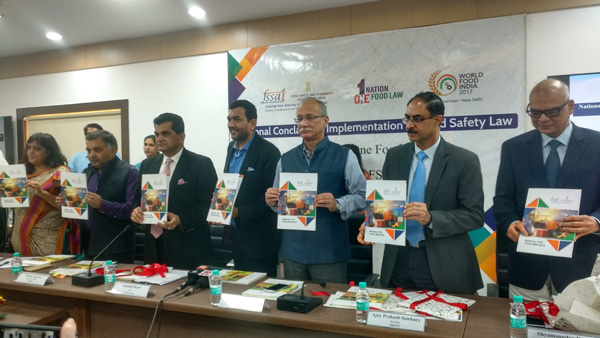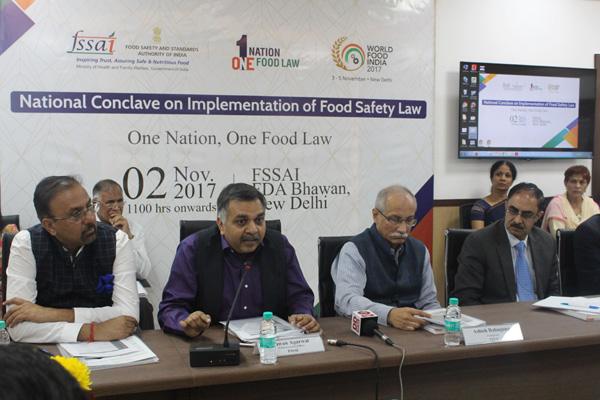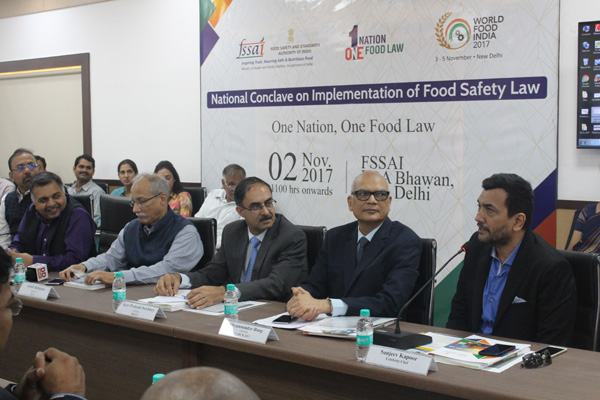
Envisaged to be a single interface for food businesses to cater to both domestic operations and food imports, the Food Safety and Standards Authority of India (FSSAI) launched the Food Regulatory Portal on the eve of the World Food India being held recently in New Delhi.
The portal marks an important milestone for effective and transparent implementation of the laws on food in the country. One Nation One Food Law is the vision behind this portal. This comes in the wake of India’s rank moving up from 130 to 100 in the Ease of Doing Business by the World Bank.
To ensure consistency and predictability of business environment, a nationwide uniform law, the Food Safety and Standards Act was enacted in 2006. While this law had envisioned a single reference point for laws on food across the nation, its implementation across the States & UTs has not always been uniform due to legacy issues, leading to business uncertainties. Further, even at the national level, a few specific issues continue to be looked after by different ministries / agencies such as legal metrology, customs, plant and animal quarantine, Bureau of Indian Standards (BIS) and AGMARK.
The launch of the Food Regulatory Portal is a major development, as it creates a robust environment for uniform implementation of the law across States / UTs and coordinated approach across central agencies, leading to a transparent and enabling business environment.
Speaking on the occasion, Chairperson, FSSAI, Ashish Bahuguna said that “the Food Regulatory Portal is a unique and comprehensive full service platform for food businesses, which would go a long way in raising the bar of the food safety in the country”. Amitabh Kant, CEO, NITI Aayog, who launched the portal lauded the efforts of FSSAI and termed this as a “key milestone in India’s regulatory reforms”added further that “FSSAI’s efforts towards consistency and transparency in enforcement and ease of doing business in the food regulatory environment would garner the confidence of all stakeholders involved.”
The Food Regulatory Portal is a full service, business-friendly portal for food businesses that focuses on six key areas viz. food standards; consistent enforcement; hassle free food imports; credible food testing; codified food safety practices; and training and capacity building. This would prove to be a game changer by addressing food business concerns across the spectrum by ensuring ease of entry; reduced burden of compliance and facilitating trade.
Ease of entry is facilitated through an online licensing and registration platform (FLRS) hosted on this portal. FLRS has now been further simplified with timelines prescribed at each stage. Food product standards have also been a major area of concern, particularly for investors wanting to bring in new products. As a starting point, India’s food standards have been benchmarked with Codex standards at the global level.
To demystify standards, Indian Food Standards-Quick access (IFS.QA) system, a responsive IT platform has been created, where a user can access thousands of product standards and millions of provisions of additives and maximum residue limits for toxins and contaminants at the click of a button.

The earlier system of product-by-product approval has been discontinued. Businesses can now develop their own products based on their proprietary recipes subject to using standard ingredients and corresponding additives. Novel food products and ingredients will also be allowed but after the associated risk is assessed in a time-bound manner.
Finally, groups comprising of experts from the industry would review the standards on an ongoing basis to make overall food standards more robust that promote public health objectives while allowing the industry to introduce new products in India. All these initiatives find a place on the Food Regulatory Portal to create transparency and reduce barriers to entry.
A major concern for food businesses is related to enforcement and compliance. While the focus is on self-compliance, the practice would be ‘to trust but verify’. To reduce compliance burden on food businesses, the Food Regulatory Portal focuses on consistency in enforcement across States and UTs. A two-pronged approach has been adopted, which would have far-reaching implications.
First, a single nationwide manual for Food Safety Officers (FSOs) has now been developed. It documents practices and procedures to be followed by the field staff as well as an 8-point code of ethics for them to their build capacity and change mindsets. A nationwide systematic training of regulatory staff has also been initiated. Secondly, digital and smart technologies are being leveraged ‘to do more with less’ and bring an end to arbitrariness and ad hoc-ism in inspections and sampling.
Food Safety Compliance through Regular Inspections and Sampling (FoSCoRIS,) formally launched replaces manual inspections with digital inspections. It uses simple mobile devices with dashboards to monitor, on real-time basis, at the district, state and national level. For consistency, standard matrices have been developed for inspection for various kinds of food businesses.
FoSCoRIS would thus ensure a consistent experience to food businesses across States and UTs, thereby building their confidence in the regulatory environment. For credible and efficient food testing for food businesses, a nationwide network of all food testing labs on a single technology platform- Indian Food Laboratory Network (InFoLNet) has also been launched. This would bring in much desired standardization in food testing, that is ‘one food product, one set of parameters and one parameter one test method’. Several measures towards trade facilitation, including a single window clearance fully integrated with Custom Authorities and risk-based inspection, have been adopted. To ensure hassle free imports, a ‘Manual for Food Imports’ has also been developed.
While FSSAI is the principal regulatory body for food, six other agencies are also involved for specific purposes. To ensure a single point of references for all food related business compliances, the Food Regulatory Portal also has compiled related information and links to other national agencies in the food safety ecosystem such as Legal Metrology, Customs, Plant and Animal Quarantine, Bureau of Indian Standards (BIS) and AGMARK. An institutional mechanism for interagency coordination and cooperation and integrated grievance redressal is also on the anvil. India HACCP and India GHP were also launched by the Quality Council of India on the occasion.

Padmashree awardee Chef Sanjeev Kapoor remarked that “Food is the second major reason for people to travel. India with its rich diversity in food is a much sought-after destination, making food safety paramount. Food is a common language that can bring all stakeholders together on a common platform to ensure safe and nutritious food. FSSAI has done a commendable job over the years in doing so in a very systematic way. I’m happy to contribute my time to support their efforts.”
Secretary, Electronics and IT, Ajay Sawhney referred to FSSAI’s move to leverage digital technologies in compliances as exemplary and assured all support. J.P. Meena, Secretary, Food Processing thanked FSSAI for this very timely move to build confidence of both foreign as well as domestic investors and food businesses.
CEO, FSSAI, Pawan Agarwal termed it as “historic in the evolution of food safety laws in the country and bringing to life the spirit that is enshrined the Food Safety Act of 2006”. The Food Safety and Standards Act 2006 unified 9 existing laws into a single Act and laid the legal ground for One Nation, One Food Law. Eleven years later, the Food Regulatory Portal launched today lays a solid foundation for uniform implementation of this law, and will go down in history as another memorable milestone.


























